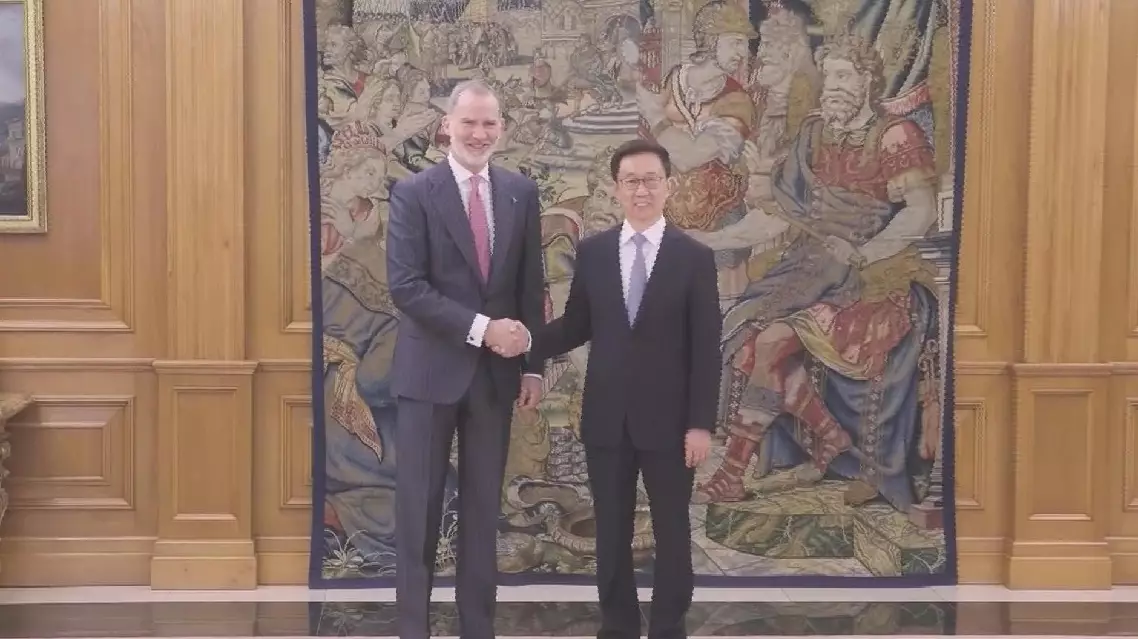Chinese Vice President Han Zheng concluded his visit to Spain running from June 10 to 12, pledging to deepen the strategic partnership and enhance cooperation between the two countries.
During the visit, Han met with Spanish King Felipe VI and Prime Minister Pedro Sanchez in Madrid, on Thursday and Wednesday respectively.
When meeting with King Felipe VI, Han conveyed President Xi Jinping's greetings to the king, saying that China appreciates the Spanish royal family's long-standing support for the development of China-Spain relations.
China is willing to further strengthen cooperation with Spain in new energy, agricultural and food products, electric vehicles, and digital economy, and intensify people-to-people exchanges in the cultural and educational sectors, Han said.
China and Spain share similar views and ideas on many major international issues, and are important positive forces in defending multilateralism, upholding free trade rules and order, promoting openness and cooperation, and improving global governance, Han said.
China is ready to work with Spain and Europe to enhance communication and dialog, jointly safeguard the international system with the United Nations at its core, and contribute to world peace, stability and development, Han added.
King Felipe VI asked Han to convey his greetings to President Xi Jinping.
Recalling his pleasant visits to China, the king said that the two countries have carried out frequent high-level exchanges this year, with continuously deepened political mutual trust and fruitful outcomes in practical cooperation, and the bilateral relations have shown positive momentum of development.
The king said Spain is ready to further strengthen cooperation with China to advance bilateral ties, adding that the world today is undergoing complex changes and China is playing an important, active and stabilizing role in this process.
Spain supports multilateralism and free trade, is willing to enhance communication and coordination with China in multilateral institutions, jointly safeguard international multilateral trade order and rules, and promote sustainable global development, he said.
When meeting with Sanchez, Han recalled the Spanish prime minister's latest visit to China in April, the third in three years, during which he had profound exchanges with President Xi Jinping and Premier Li Qiang. The two sides agreed to deepen mutually beneficial cooperation, maintain the free trade order, and safeguard international equity and justice, and underscoring the vital significance of China-Spain relations in promoting global stability and prosperity, Han added.
This year marks the 20th anniversary of the establishment of a comprehensive strategic partnership between China and Spain. Han said China is ready to take this opportunity to work with the Spanish side to maintain high-level exchanges, and deepen mutually beneficial cooperation.
Against the backdrop of the current volatile international situation, China and Europe should enhance solidarity and cooperation, maintain multilateralism and free trade, Han said, adding that such efforts are not only beneficial to China and Europe, but also conducive to stabilizing the global economy.
Han also expressed his hope that Spain will play an active role in pushing forward the sound and steady development of China-Europe relations.
Sanchez said China's adherence and commitment to multilateralism are particularly valuable at a time when unilateralism and protectionism are harming all countries' interests.
The Spanish government upholds the one-China policy and welcomes more Chinese businesses to invest in Spain, he added.
Sanchez also expressed the Spanish government's willingness to play an active role in boosting Europe-China relations.
During his visit, Han also met with Spanish Foreign Minister Jose Manuel Albares.
He also attended a welcome banquet held by Chinese and Spanish business communities and delivered a speech, saying that China is determined to expand its high-level opening-up and actively supports the two countries' enterprises to strengthen economic, trade and investment cooperation.
Han also paid a visit to Sevilla, the capital and largest city of the Spanish autonomous community of Andalusia, and had in-depth and friendly exchanges with Juanma Moreno, president of the regional government of Andalusia.

Chinese VP concludes Spain visit









